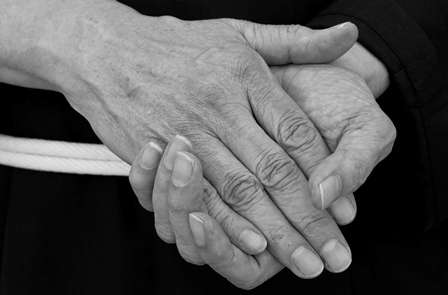UEA research underpins 'Respect and Protect' report

Organisational factors in care homes are crucial in providing good care, and can be to blame when elderly residents don't receive the compassion and care they deserve, according to research from the University of East Anglia (UEA).
UEA researchers led two of 11 projects underpinning the 'Respect and Protect' report commissioned by Comic Relief and the Department of Health.
Launched today, the report draws together the findings of a major programme of research into the experiences of older people and care staff in care homes and hospitals in England and Wales.
It shows that creating a culture of care and respect is key to preventing the mistreatment of older people in care homes and hospitals. Supportive leadership and an environment of trust and openness can help prevent staff from doing harmful things. But a culture that does not value and respect staff can mean that good people may end up providing neglectful or unsafe care.
Dr Anne Killett, from UEA's school of Rehabilitation Sciences, led two of the 11 reports commissioned as part of the PANICOA Initiative (Prevention of Abuse and Neglect in the Institutional Care of Older Adult). Older people played a key part in carrying out the research alongside university based researchers.
She said: "When things go wrong in the residential care of older people, individual workers may well be held responsible. But our research showed that organisational factors can have a large part to play.
"Good quality care depends on a range of organisational factors, which include skill mix, training and numbers of staff; management and procedures; characteristics of the resident group; infrastructure of the organisation; contextual factors.
"The way these factors interact can either enhance or obstruct the quality of care that staff can provide. Residents, relatives and staff often have key insights about organisational problems, and should be actively involved in any inspection or monitoring.
"Organisational culture is key to good care, but cannot be achieved simply by importing a set of organisational values or the 'right' leader or staff. Rather, it is necessary to find ways of resolving the everyday demands of practice in ways that are consistent with espoused values.
"Our findings are important as they show how good care can change quickly; that staff can be prevented from giving good care by organisational factors and that residents, relatives and care staff need to be meaningfully involved in inspections and monitoring. It is important to see what unexpected effects there are when a solution to a problem is put in place."
Keys findings of the PANICOA report include:
- Many care staff face work-related stress or 'burn out' and some on the 'frontline of care' face a real risk of physical harm or verbal abuse.
- Much good and excellent care of older people is taking place in hospitals and care homes. Overall the quality of care suffers more from lack of resources and time pressures than from the bad actions or inactions of care staff.
- Abuse and neglect do occur, especially long-term neglect that results from poor organisational systems and practices, and there are risks from physical environments ill-suited to the care of frail older people.
- Disrespectful and patronising attitudes to older people are widespread from staff at all levels, especially in the NHS which needs to reflect and accept the fact that older people are now the great majority of its patients.
- Alongside regular training and support the way in which an organisation treats its staff is central to a strong care culture. Patients and residents are more likely to be treated with respect and dignity by staff who are treated in the same way by their colleagues and employers.
Key recommendations include:
- Care providers need to develop and maintain strong cultures of safe and respectful care, supporting and valuing their staff, as well as the people they care for.
- Identifying and monitoring the signs of organisational ill-health and stress at an early stage is critical in preventing mistreatment of staff as well as residents and patients.
- Promoting a safe and respectful care culture, actively challenging abuse and neglect all day, every day is the responsibility of all managers, owners, professionals, commissioners and regulators.
- Improved collaboration, underpinned by a stronger sense of 'common purpose', between regulators, commissioners, safeguarding bodies, educators and policy makers, is likely improve our collective ability to ensure the safe and respectful care of older people.
More information: All 11 studies commissioned under this initiative can be downloaded from www.panicoa.org.uk.















